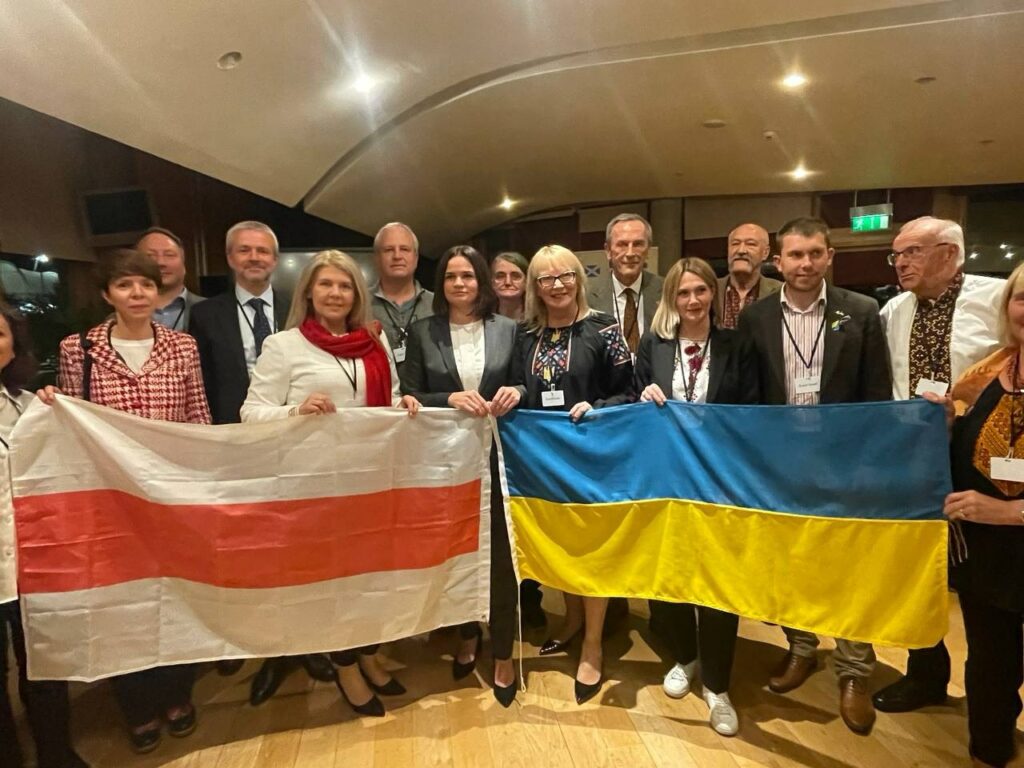Passports, political prisoners and Interpol: What People’s Embassies do

The People’s Embassies serve as alternative representational offices for Belarus and the Belarusian community abroad. The initiative to establish the People’s Embassies was undertaken by the Belarusian diasporas community in December 2020. The number of representative offices for Belarusians abroad has increased during this time, with operations now established in over 20 countries. While the official embassies of Belarus neglect their duties, the People’s Embassies step in to partially replace the activities of regime diplomats. They defend the interests of Belarusians abroad, provide assistance to political prisoners and their families. Malanka Media discussed the efforts of the People’s Embassies with their representatives — Aliaksandra Mamaeva from Slovenia and Irina McLean from Scotland.
Sports and cultural events, engagement with politicians, and interaction with the media constitute only a part of the People’s Embassies’ activities in promoting the Belarusian agenda. Furthermore, Aliaksandra Mamaeva, the coordinator of the People’s Embassies and the representative of the People’s Embassy of Belarus in Slovenia, notes that volunteers of alternative representational offices are compelled to find solutions to the challenges created by the regime for Belarusians abroad. Hence, to some degree, the People’s Embassies take on the role of official embassies.
The People’s Embassy of Belarus in Slovenia officially represented Belarus three times last year. The same practice exists in other countries; for example, the People’s Embassies hold monthly meetings with the Foreign Ministries of Great Britain and France. Aliaksandra emphasizes that alternative embassies cannot fully replace diplomatic missions. They lack the capacity to perform consular functions and do not possess official recognition and support. The People’s Embassies cooperate with the United Transitional Cabinet, but their activities are constrained by international norms and agreements.
Despite lacking the authority to provide consular functions, the People’s Embassies offer assistance to Belarusians abroad in every possible way, particularly in the absence of action from official diplomatic missions.
Pashpart.org
The People’s Embassies executed several major projects this year, among them the launch of the pashpart.org project — a service providing information about obtaining a so-called “foreigner passport” – a valid document confirming identity – for Belarusians abroad. As of September 2023, Belarusians abroad no longer have the right to exchange or obtain a Belarusian passport at official diplomatic missions; now, this can only be done on the territory of Belarus.
“We launched this website within a week of the decree taking effect because the so-called “foreigner passport” serves as a viable alternative for Belarusians. Here, we gather all the necessary information and provide guidance on obtaining documents abroad. Additionally, we are collaborating with the New Belarus project ‘Usio budzie lehalna’ (‘Everything will be legal’) on this matter,” explains Aliaksandra.
Aiding in the evacuation of Belarusians and preventing deportation to Belarus
The second major campaign is assistance in evacuating Belarusians from Israel. While the official diplomatic mission of Belarus remained inactive, the People’s Embassies gathered information about evacuation flights and assisted Belarusian citizens in need of help to leave the country.
Another campaign undertaken by the People’s Embassies involves countering the misuse of the Interpol system to persecute Belarusians abroad. The idea for this campaign emerged following the detention of a Belarusian in Slovenia, whom Aliaksandra Mamaeva assisted in avoiding deportation to Belarus. After this incident, the People’s Embassies formulated recommendations to assist Belarusians in avoiding arrests and deportations. Additionally, they provided recommendations to various law enforcement and government agencies, including national bodies of Interpol, on how to engage with Belarusian citizens. As a result, there have been no deportations in the past year, and those detained at Interpol’s request were eventually released.
In collaboration with Italian politicians and the Anolf Association, the People’s Embassy in Italy secured the release of a detained Belarusian after two months of arrest.
Another major campaign is aimed at halting the activities of the Minsk Saint Elisabeth Convent in Europe. The convent participates in European fairs and raises funds to support Russian troops in Ukraine.

The People’s Consulate in Scotland: What the alternative representational office does in this country
This year, the focus of the People’s Consulate in Scotland was primarily on assisting political prisoners through the media, says Irina McLean, the representative of the People’s Consulate in Scotland.
The Scottish publishing house released Maxim Znak’s book “The Zecameron”, and the works and poems of political prisoners, translated into English, are showcased in the form of posters at an exhibition in one of the galleries. Local residents have shown interest in the problem of Belarusian political prisoners: university students participating in the Scholars at Risk program conducted a campaign in support of Marfa Rabkova, a human rights activist and a political prisoner, and created a petition.
The People’s Consulate in Scotland paved the way for everything related to football and Aliaksandr Ivulin. The first tournament in support of the political prisoner and journalist took place in the fall of 2021, featuring members of the Scottish Parliament and the Belarusian diaspora.
“We supported Aliaksandr Ivulin throughout his time in prison, and upon his release, I went to meet him in Warsaw. Currently, we are planning Aliaksandr’s visit to the UK. In this way, through sports, we aim to draw attention to Belarusian political prisoners,” says Irina.